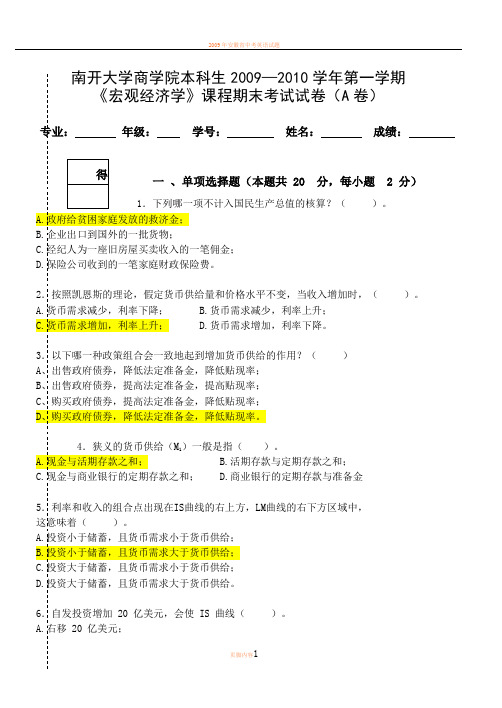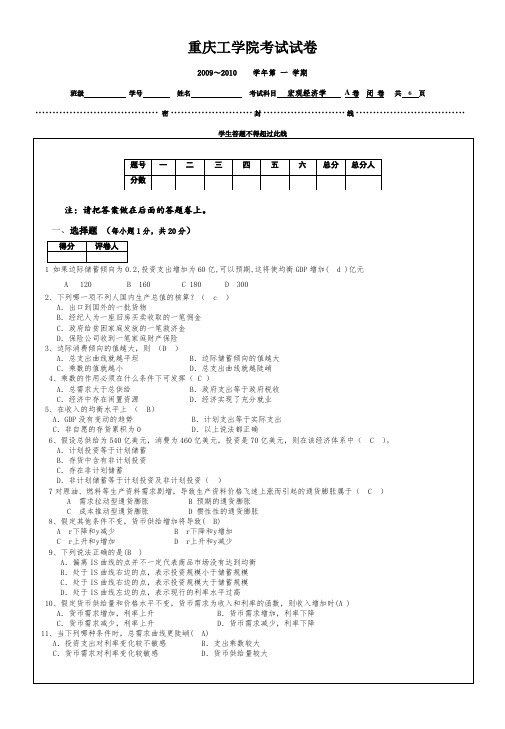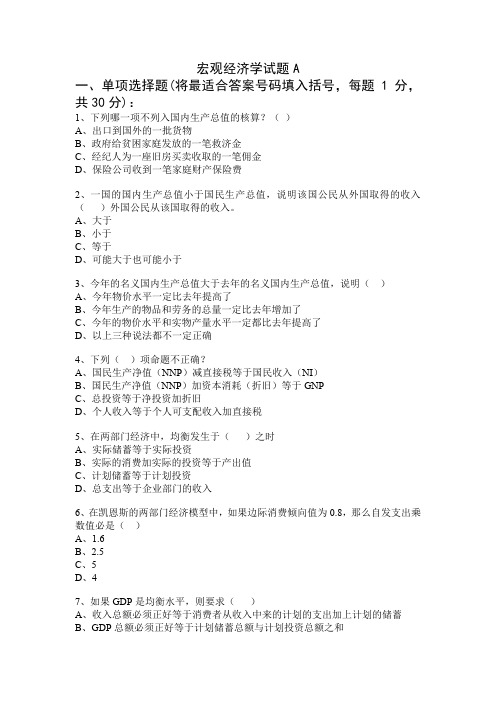2009年宏观经济学试卷(A卷)
2009年宏观经济学试卷(A卷)

2010学年第一学期Array A卷)姓名:成绩:20 分,每小题 2 分))。
)。
)B.左移 20 亿美元;C.右移支出乘数乘以 20 亿美元;D.左移支出乘数乘以 20 亿美元。
d为投资对利率的弹性。
d越大,()。
B. IS曲线的斜率越小曲线的斜率越小GDP,其构成项目是( ))。
)。
4题作答,每题10分,共40分)MPC和APC,并说明理由。
2.试推导出LM方程,并分析LM曲线移动的主要影响因素及作用。
参考教材。
3.试说明凯恩斯的三种货币需求动机,并说明什么是流动性陷阱。
1. 货币需求的动机(1)交易性货币需求:指人们因生活消费和生产消费所需要的货币。
(2)预防性货币需求:指人们为了应付突发性事件所保留的货币。
(3)投机性货币需求:指人们通过买卖有价证券所动用的货币。
流动性陷阱:指利率水平较低、证券市场的获利空间较大时,人们对货币的流动性偏好趋于无限大的现象,也称凯恩斯陷阱。
4.试根据所学的内容,解释20世纪70年代的“滞胀”现象。
5.试说明哈罗德—多马模型的核心思想,并简述它和凯恩斯“节俭的悖论”是否矛盾。
哈罗德模型的核心思想和主要内容:一是长期、连续实现充分就业均衡的条件,涉及三个经济增长率;二是经济增长的不稳定特征,涉及乘数原理和引致投资的关系。
长期保持充分就业的稳定经济增长(充分发挥潜能的经济增长)就必须使三个增长率都相等:G=Gn=Gw;多马模型经济增长模型公式ΔI/I=aδ,公式的左边是投资的增长率,右边是边际储蓄倾向与资本效率的乘积。
这个公式表明,要保持不断的充分就业,每年的投资就必须按aδ速度增长。
不矛盾。
比较:立足点相同:I==S。
但差别有三:静态与动态;短期与长期;政策运用工具不同。
6.什么叫通货膨胀?试说明通货膨胀对大学生就业有什么影响。
通货膨胀有助于就业的增加或失业的减少。
菲利普斯的观点:通货膨胀率与失业率互为消长(菲利普斯曲线)三、计算题(任选2题作答,每题10分,共20分)1.假设一国有下列国民收入统计资料(单位亿元)得分国内生产总值 6800; 总投资 800; 净投资 300消费 4000; 政府购买 1000; 政府预算盈余 500试计算:NDP 、X-M 、Tn 、DPI 、S2.假设某经济的消费函数为1000.8d c y =+,投资50i =,政府购买性支出200g =,政府转移支付62.5r t =,税收250T =(单位均为亿美元)。
2009级宏观经济学试卷A卷

福建师范大学协和学院10-11学年第一学期2009级《宏观经济学》试卷(A卷)试卷类别:闭卷考试时间:120分钟一、单项选择题(本大题共15小题,每小题1分,共15分)1、在通货膨胀期间,名义GDP的增长率比实际GDP的增长率()A.快 B.相等C.慢D.都有可能2、去年CPI为120,今年为132,今年的通货膨胀率为()A.6% B.10%C.32% D.无法判断3、在下列选项中,投资乘数最大的是()A.边际消费倾向为0.6 B.边际储蓄倾向0.1C.边际消费倾向为0.4 D.边际储蓄倾向0.34、自主消费增加对IS曲线的影响是()A.向左移动,曲线变缓 B.向左移动,斜率不变C.向右移动,曲线变陡D.向右移动,斜率不变5、在迪斯尼王国中,货币流通速度是不变的。
实际GDP每年增长5%,货币存量每年增长14%,而名义利率是11%。
实际利率是()A.2% B.3%C.6% D.9%6、根据托宾的“q”说,当企业的股票市场价值大于新建企业的成本,则()A.总投资将会增加B.购买旧企业更划算C.总投资将会减少D.无法确定7、在其他情况不变时,下列事件中会使得一国政府公债或隐含债务变小的是()A.实际GDP增长率提高B.退休年龄降低C.提升个税起征点D.政府发行债券用于支付当前公债利息8、利率和收入的组合点出现在IS曲线的右上方,LM曲线的左上方的区域中,则表示()A.投资小于储蓄,且货币需求小于货币供给B.投资小于储蓄,且货币供给小于货币需求C.投资大于储蓄,且货币需求小于货币供给D.投资大于储蓄,且货币供给小于货币需求9、凯恩斯陷阱是指证券价格的()A.高位区B.中位区C.低位区D.无法确定10、一般来说,部分协和学院学生刚毕业时找不到工作属于哪种失业类型?()A.非自愿性失业B.摩擦性失业C.周期性失业D.结构性失业11、总供给曲线向上移动的原因是()A.需求增加B.价格提高C.技术进步D.劳动力成本提高12、如果把名义货币需求定义为M1,下述事件会使得货币需求量沿着货币需求曲线移动,而不是导致货币需求曲线本身移动的是()A.利率水平从12%下降到10% B.春节的来临掀起了假期购物季的序幕C.麦当劳与其他快餐店开始接受信用卡D.中国人民银行在公开市场中卖出央票13、基础货币等于非银行部门持有的通货加上()。
宏观经济学A卷试题含答案

《宏观经济学》试卷A注意:请在答题纸上作答,考试时间120分钟,可以翻阅纸质字典,不得携带电子词典及手机等。
Part 1: Single Choice (40×1′=40′)1. Macroeconomics is the study of ( ) a. market regulation. b. money and financial markets. c. economy-wide phenomena. d. how households and firms make decisions and how they interact.2. National income is defined as ( ) a. all income produced within a country. b. the income received by the national government. c. the total income earned by a nation’s residents f rom the production of goods and services within the borders of the country. d. the total income earned by a nation’s residents in the production of goods and services.3. The best measure of a country’s production of goods and services is ( ) a. real GDP. b. real NNP. c. nominal GDP. d. nominal GNP.4. GDP is used as the basic measure of a society’s economic well -being. A better measure of the economic well-being of individuals in society is ( ) a. the consumption component of GDP. b. GDP per person. c. government expenditures per person. d. the level of business investment.5. The inflation rate is defined as the ( ) a. cost of inflation. b. cost of borrowing. c. percentage change in real GDP from the previous period. d. percentage change in the price level from the previous period.6. If the nominal interest rate is 8% and rate of inflation is 2%, the real interest rate is ( ) a. 16%. b. 10%. c. 6%. d. 4%.7. What is the purpose of measuring the overall level of prices in the economy? ( ) a. to allow consumers to know what kinds of prices to expect in the future b. to allow the measurement of GDP c. to allow comparison between dollar figures from different points in time d. All of the above are correct.8. A COLA automatically raises the wage rate when ( ) a. real GDP increases. b. the labor force increases.c. taxes increase.d. the consumer price index increases.9. A certificate of indebtedness that specifies the obligations of the borrower to the holder is called a ( ) a. stock. b. mutual fund. c. bond. d. All of the above are correct. 10. Stock indexes are ( ) a. reports in the newspapers that report on the price of the stock and earnings of individual corporations over time. b. the average of a group of stock prices. c. measures of the risk relative to the profitability of corporations. d. measures of the price of a stock relative to its risk.11. If Congress raised the tax on interest income, investment ( ) a. and saving would increase. b. and saving would decrease. c. would increase and saving would decrease. d. would decrease and saving would increase. 12. An increase in the budget deficit shifts the ( ) a. demand for loanable funds left. b. demand for loanable funds right. c. supply of loanable funds left. d. supply of loanable funds right.13. Which of the following beliefs would make someone less likely to oppose government deficits? ( ) a. The return on private investment is higher than the return on public investment. b. Taxes considerably distort private decision making. c. The demand for loanable funds curve is very steep. d. All of the above would make someone less likely to oppose government deficits.14. Which of the following people is counted as unemployed according to official statistics? ( ) a. Nancy, who is on temporary layoff b. Gary, who has retired and is not looking for work c. Brian, a full-time student who is not looking for work d. All of the above are correct.15. The natural rate of unemployment is ( ) a. zero percent. b. the rate associated with the highest possible level of GDP. c. created primarily by short-run fluctuations in real GDP. d. the amount of unemployment that the economy normally experiences. 16. Sectoral shifts in the economy ( ) a. create structural unemployment. b. immediately reduce unemployment. c. on net leave unemployment unchanged. d. increase unemployment due to job search. 17. Minimum wage laws ( )院系: 专业班级: 姓名: 学号:装 订 线a. probably reduce teenage employment.b. are probably the major cause of natural unemployment.c. probably most adversely affect skilled workers.d. All of the above are correct.18. Angela is the newly appointed CEO of a company that manufactures computer chips on an assembly line. Her staff has told her that given productivity numbers, they suspect some workers may be shirking. According to efficiency wage theory, what should she do? ( ) a. Pay all workers more than the equilibrium wage rate. b. Reward those who shirk with higher wages. c. Pay below the equilibrium wage rate to make up for the loss from shirking. d. Make sure that workers are getting paid exactly the equilibrium wage rate.19. Which of the following best illustrates the unit of account function of money? ( ) a. You list prices for candy sold on your Web site, , in dollars. b. You pay for tickets to a WNBA game with dollars. c. You keep $10 in your backpack for emergencies. d. None of the above is correct. 20. M1 includes ( ) a. savings deposits. b. money market deposit accounts. c. currency. d. All of the above are correct.21. The Federal Open-market Committee is made up of ( ) a. 5 of the 12 presidents of the Federal Reserve Regional banks, and the 7 members of the Board of Governors. b. the 12 presidents of the Federal Reserve Regional banks, and the Chair of the Board of Governors. c. the 12 presidents of the Federal Reserve Regional banks, and the 7 members of the Board of Governors. d. 7 of the 12 presidents of the Federal Reserve Regional banks, and the 5 members of the Board of Governors.22. If banks choose to hold more excess reserves, ( ) a. required reserves in the banking system increase. b. the money multiplier will increase. c. the discount rate will increase. d. the money supply falls.23. The Fed can influence unemployment in ( ) a. the short run, but not the long run. b. the short and long run. c. the long run, but not the short run. d. neither the short nor long run.24. When the price level rises, the number of dollars needed to buy a representative basket of goods ( ) a. decreases, so the value of money rises. b. decreases, so the value of money falls. c. increases, so the value of money rises.d. increases, so the value of money falls.25. If velocity and output were nearly constant, ( ) a. the inflation rate would be much higher than the money supply growth rate. b. the inflation rate would be much lower than the money supply growth rate. c. the inflation rate would be about the same as the money supply growth rate. d. Any of the above could be correct, more information is needed.26. If the money supply growth rate permanently increased from 10 percent to 20 percent we would expect that inflation and nominal interest rates would both increase ( ) a. by more than 10 percentage points. b. by 10 percentage points. c. but by less than 10 percentage points. d. None of the above is correct. 27. Shoeleather costs refer to ( ) a. the cost of more frequent price changes induced by higher inflation. b. resources used to maintain lower money holdings when inflation is high. c. the distortion in resource allocation created by distortions in relative prices due to inflation. d. the distortion in incentives, created by inflation, by taxes that do not adjust for inflation. 28. In order to maintain stable prices, the central bank must ( ) a. tightly control the money supply. b. keep unemployment low. c. sell indexed bonds. d. All of the above are correct. 29. Business cycles ( ) a. are explained mostly by fluctuations in corporate profits. b. no longer are very important due to government policy. c. are fluctuations in real GDP and related variables over time. d. All of the above are correct.30. Most economists believe that classical economic theory is a good description of the world in ( ) a. the long run, but not in the short run. b. the short run, but not in the long run. c. the short run and in the long run. d. neither the short nor long run.31. A decrease in U.S. interest rates leads to ( ) a. an appreciation of the dollar that leads to smaller exports. b. an appreciation of the dollar that leads to greater net exports. c. a depreciation of the dollar that leads to smaller net exports. d. a depreciation of the dollar that leads to greater net exports. 32. The long-run aggregate supply curve shifts right if ( ) a. Congress raises the minimum wage substantially. b. unemployment insurance benefits are made more generous. c. immigration from abroad increases. d. All of the above are correct.院系: 专业班级: 姓名: 学号:装 订 线33. Suppose a shift in aggregate demand creates an economic contraction. If policymakers can respond with sufficient speed and precision, they can offset the initial shift by shifting aggregate ( ) a. supply left. b. supply right. c. demand left. d. demand right.34. Which of the following has been suggested as an important cause of the Great Depression? ( ) a. a decline in the money supply b. a large decline in government expenditures c. an increase in the relative price of oil d. All of the above are correct.35. According to liquidity preference theory, which of the following shifts the money demand curve to the left? ( ) a. a decrease in the price level b. an increase in the price level c. an increase in the interest rate d. Both b and c are correct.36. If Congress cuts spending to balance the federal budget, the Fed can act to prevent unemployment and recession while maintaining the balanced budget by ( ) a. raising taxes. b. cutting expenditures. c. increasing the money supply. d. decreasing the money supply.37. Investment tax credits are designed to ( ) a. increase aggregate demand in the short run and eventually increase long-run aggregate supply. b. increase aggregate demand in the short run, but eventually decrease long-run aggregate supply. c. increase aggregate demand in the short run and have no impact on aggregate supply. d. None of the above is correct.38. According to Friedman and Phelps, the unemployment rate is above the natural rate when actual inflation ( ) a. is greater than expected inflation. b. equals expected inflation. c. is less than expected inflation. d. is high.39. The restrictive monetary policy followed by the Fed in the early 1980s ( ) a. reduced both unemployment and inflation. b. reduced inflation significantly, but at the cost of a severe recession. c. reduced unemployment significantly, but at the cost of higher inflation. d. raised both unemployment and inflation.40. A favorable supply shock will cause the short-run Phillips curve to shift ( ) a. left, and unemployment to rise. b. left, and unemployment to fall. c. right, and unemployment to rise. d. right, and unemployment to fall.Part 2: Simply answer following questions (4×5′=20′)1. How will following events influence the GDP of U.S. by expenditure method? (1)Boeing Company sold a plane to the U.S. Air Force. (2)Boeing Company sold a plane to the U.S. Air Company. (3)Boeing Company sold a plane to the Franc Air Company. (4)Boeing Company sold a plane to Mr. Cross.(5)Boeing Company produced a plane which will be sold in the next half year. 2. Who control the money supply? How does it control?3. Try to tell the relationship between short run Philips curve and long run Philips curve.4. What factors can cause unemployment? How?Part3: Calculate (2×10′=20′)1. Consider following events in certain economy:Y=5000、G=1000、T=1000、C=250+0.75(Y -T)、I=1000+50R(1)Try to calculate private saving, public saving and national saving in this economy (2) Try to find the equilibrium interest rate(3) Suppose Government purchase increase to 1250, try to calculate private saving, public saving and national saving(4) Try to find the new equilibrium2. Suppose in an economy, there are 0.76 billion adults, and 0.48 billion of them are working, 0.04 billion of them are looking for job, 0.18 billion of them are neither working nor looking for a job. Try to calculate(1) Labor force amount (2) Labor participate rate (3) Unemployment ratePart4: Analysis following questions(2×10′=20′)1. Try to tell the development path of macroeconomics. (How did it appear? How did it change?)2. Try to use the macroeconomics knowledge to analyze the current economic condition and try toafford some macroeconomic policies in China, and try to analyze their impacts to economy.院系: 专业班级: 姓名: 学号:装 订 线《国际贸易专业宏观经济学》试卷A宏观经济学(双语)A 卷参考答案Part1:1C 2D 3A 4B 5D 6C 7C 8D 9C 10B 11 B 12C 13C 14A 15D 16D 17A 18A 19A 20C 21A 22D 23A 24D 25C 26B 27B 28A 29C 30A 31A 32C 33D 34A 35A 36C 37A 38C 39B 40B Part2:1. (1) Increases government purchases and then increases GDP (2) Increases investment and then increases GDP (3) Increases net export and then increases GDP (4) Increases consumption and then increase GDP (5) Increases investment and then increase GDP2. Federal Open Market Committee conducts monetary policy by controlling the money supply. The money supply is the quantity of money available in the economy. The primary way in which the Fed changes the money supply is through open-market operations. The Fed purchases and sells U.S. government bonds. To increase the money supply, the Fed buys government bonds from the public. To decrease the money supply, the Fed sells government bonds to the public.3. The Phillips curve shows the short-run combinations of unemployment and inflation that arise as shifts in the aggregate demand curve move the economy along the short-run aggregate supply curve. The Phillips curve seems to offer policymakers a menu of possible inflation and unemployment outcomes. As a result, the long-run Phillips curve is vertical at the natural rate of unemployment. Monetary policy could be effective in the short run but not in the long run. In the long run, expected inflation adjusts to changes in actual inflation.4. Job search, this unemployment is different from the other types of unemployment. It is not caused by a wage rate higher than equilibrium. It is caused by the time spent searching for the “right” job. Minimum wage laws, although minimum wages are not the predominant reason for unemployment in our economy, they have an important effect on certain groups with particularly high unemployment rates. When the minimum wage is set above the level that balances supply and demand, it creates unemployment. Unions, a union is a worker association that bargains with employers over wages and working conditions. In the 1940s and 1950s, when unions were at their peak, about a third of the U.S. labor force was unionized. A union is a type of cartel attempting to exert its market power. Efficiency wages, Efficiency wages are above-equilibrium wages paid by firms in order to increase worker productivity. The theory of efficiency wages states that firms operate more efficiently if wages are above the equilibrium level.Part3:1. (1) Private saving=Y-T-C=5000-1000-(250+0.75*4000)=750 Public saving=T-G=1000-1000=0 National saving=750(2) I=S 1000+50R=750 R=-5 (3) Private saving=750Public saving=T-G-1000-1250=-250 National saving=500(4) 1000+50R=500 R=-10 2. (1) labor force: 0.48+0.04=0.52(2) Labor participate rate: 0.52/0.76=68% (3) Unemployment rate: 0.04/0.52=7.7%院系: 专业班级: 姓名: 学号:装 订 线。
09-10宏观A卷有完整答案

浙江万里学院2009/2010学年第二学期《宏观经济学》期末试卷( A 卷)考试时间:120分钟闭卷班级:学号:姓名:成绩:一、单项选择题(本大题共20小题,每小题1分,共20分)在每小题列出的四个选项中只有一个选项是符合题目要求的,请将正确选项前的字母填在题后的括号内。
1.在国民收入体系中,测度一定时期所有最终产品和劳务的货币价值量的是( B)。
A.国民收入 B.国民生产总值C.国民生产净值 D.可支配收入总和2、国民生产总值与国民生产净值之间的差别是( B)。
A.直接税; B.折旧;C.间接税; D.净出口。
3、已知:消费额=6亿元,投资额=1亿元,间接税1亿元,政府用于商品和劳务的支出费=1.5亿元,出口额=2亿元,进口额=1.8亿元,则(C)。
A.NNP=8.7亿元 B.GNP=7.7亿元C.GDP=8.7亿元 D.NNP=5亿元4、线性消费曲线与45度线之间的垂直距离为( D )。
A.自发性消费; B.总消费;C.收入; D.储蓄。
5、在以下三种情况中,投资乘数最大的是( B )A.边际消费倾向为0.6 B.边际储蓄倾向为0.1C.边际消费倾向为0.4 D.边际储蓄倾向为0.36、假定某国经济目前的均衡收入为5500亿元,如果政府要把收入提高到6000亿元,在边际消费倾向等于0.9的条件下,应增加支出( B )A.500亿元 B.50亿元 C.10亿元 D.30亿元7、财政政策(A)A.涉及政策支出和税收水平 B.包括创造工作岗位计划C.包括最低工资安排,所有的工人至少可以得到一个公平的工资D.包括失业保险计划8、如果存在通货膨胀缺口,应采取的财政政策是(A)。
A.增加税收; B.减少税收;C.增加政府支付; D.增加转移支付。
9、利率变动反映最敏感的是(C)。
A.货币的交易需求; B.货币谨慎需求;C.货币的投机需求; D.三种需求反应相同10、当法定准备金为20%,商业银行最初所吸收的存款为3000货币单位时,银行所能创造的货币总量为(C)。
宏观经济学试题A卷2010-1范文

重庆工学院考试试卷2009~2010 学年第一学期班级学号姓名考试科目宏观经济学A卷闭卷共 6 页····································密························封························线····································································密························封························线································学生答题不得超过此线12、假定经济实现充分就业,总供给曲线是垂直线,扩张的财政政策将 ( B)A.提高价格水平和实际产出 B.提高价格水平但不影响实际产出C.提高实际产出但不影响价格水平 D.对价格水平和产出均无影响13、在下述哪种情况下,会产生挤出效应。
宏观经济学试卷及答案

2008/2009学年第一学期A二、单项选择题(每小题1分,共10分)1. 下列哪一项不列入国内生产总值的核算?()A.出口到外国的一批货物;B.政府给贫困家庭发放的一笔救济金;C.经济人为一笔旧房买卖收取佣金;D. 保险公司收到一笔家庭财产保险1. B;2. 在两部门经济中,均衡发生于()之时。
A.实际储蓄等于实际投资;B. 计划储蓄等于计划投资;C.实际的消费加实际的投资等于产出值;D.总支出等于企业部门的收入2. B;3.假定其他条件不变,税收增加将引起国民收入()。
A.增加,但消费水平下降;B.增加,同时消费提高;C.减少,同时消费水平下降;D.减少,但消费水平上升3. C;4.利率和收入的组合点出现在IS曲线右上方,LM曲线的左上方的区域中,则表示( )。
A.i<s ,L<M;B.i>s ,L>M;C.i>s ,L<M;D.i<s ,L>M4. A;5. 在IS-LM 模型中,若经济处于中间区域,货币供给增加将导致( )。
A.收入增加,利率上升; B.收入减少,利率上升;C.收入增加,利率降低; D.收入减少,利率降低5. C;6. 在其它因素不变情况下,自发性投资增加10亿美元,IS曲线将( )。
A.右移10亿美元;B.左移10亿美元;C.右移支出乘数乘以10亿美元;D.左移支出乘数乘以10亿美元6. C;7. 中央银行提高再贴率会导致货币供给量()。
A.增加和利率提高;B.减少和利率提高;C.增加和利率降低;D.减少和利率降低7. B;8.()将会使长期总供给曲线向右移动。
A.生产技术水平的进步;B.生产要素投入数量的增加;C.扩张性的财政政策;D.扩张性的货币政策8. A;9. 以下哪两种情况不可能同时发生()。
A.结构性失业和成本推进型通货膨胀;B.需求不足失业和需求拉上型的通货膨胀;C.摩擦性失业和需求拉上型通货膨胀;D.失业和通货膨胀9.B;10.经济周期的实质是()。
宏观经济学试题A

C、消费者支出总额必须正好等于收入的收支平衡水平 D、所得收入总额必须正好等于全体消费者从收入中来的计划支出加上计划投资 总额 8、边际消费倾向是指( ) A、在任何收入水平上,总消费对总收入的比率 B、在任何收入水平上,由于收入变化而引起的消费支出的变化 C、在任何收入水平上,当收入发生微小变化时,由此而导致的消费支出变化对 收入水平变化的比率 D、以上答案都不正确 9、如果人们不是消费其所有收入,而是将未消费部分存入银行或购买证券,这 在国民收入的生产中是( ) A、储蓄而不是投资 B、投资而不是储蓄 C、既非储蓄又非投资 D、是储蓄,但购买证券部分是投资 10、当市场对某种产品的需求在某一年突然增加时,预期这将导致( ) A、厂商马上增加固定资产投资,扩大生产规模,以适应市场需求 B、厂商保持生产规模不变 C、厂商增加对原材料和劳动力的投入,其增加的产出就是市场需求的增加量 D、厂商增加对原材料和劳动力的投入,其增加的产出一般小于市场需求的增加 量 11、如果资本的生产率提到的话,可以预期( A、资本需求将下降 B、资本产出将下降 C、预期净收入流的现值将下降 D、最优资本存量将上升 )
(2)若其他情况不变,政府支出 G 增加 20,收入、利率和投资有什么变化? (3)是否存在挤出效应? 4、已知资本—产出比率为 4,假设某国某年的国民收入为 1000 亿美元,消费为 800 亿美元。按照哈罗德增长模型,要使该年的储蓄全部转化为投资,第二年的 增长率应该为多少?
09—10 学年第一学期《宏观经济学》小题,每小题 1 分,共 30 分)
1、B 2、A 3、D 4、A 5、C 6、C 7、D 8、C 9、A 10、 D 11、D 12、C 13、B 14、A 15、B 16、D 17、D 18、 A 19、A 20、C 21、D 22、B 23、B 24、A 25、B 26、A 27、C 28、A 29、C 30、A
宏观经济学期末考试试卷与答案( A 卷)

宏观经济学期末考试试卷及答案( A 卷)一、名词解释题(本题型共5题。
每题2分,共10分,将答案写在答题纸上)1.国民生产总值2. 消费函数3. 充分就业4 经济周期5. 菲利普斯曲线二、单项选择题(本题型共30题。
每题正确答案只有一个,从每题的备选答案中选出正确的答案,将其英文字母编号填入答题纸上相应的空格.....内。
每题1分,共30分)1、今年的名义国内生产总值大于去年的名义国内生产总值,说明:( )A.、今年物价水平一定比去年高了;B、今年生产的物品和劳务的总量一定比去年增加了;C、今年的物价水平和实物产量水平一定都比去年提高了;D、以上三种说法都不一定正确。
2、一国的国内生产总值小于国民生产总值,说明该国公民从外国取得的收入( )外国公民从该国取得的收入( )A.、大于;B、小于;C、等于;D、可能大于也可能小于。
3、两部门的均衡是:()A: I=S;B: I+G=S+T;C: I+G+X=S+T+M;D: AD=AS。
4、一般地说,通货膨胀会使()。
A.债权人受损,债务人受益;B.债权人受益,债务人受损;C.债权人和债务人都受益;D.债权人和债务人都受损。
5、在货币总量不变条件下,当物价上升,货币投机需求减少,利率上升,从而抑制投资需求和居民信贷消费需求,导致产出的下降,这种效应被称为()A. 净出口效应;B. 利率效应;C.实际余额效应;D.财富效应。
6、总需求曲线向下倾斜的原因之一是( ):A. 随着价格水平下降,家庭的实际财富下降,他们将增加消费;B. 随着价格水平上升,家庭的实际财富下降,他们将减少消费;C. 随着价格水平下降,家庭的实际财富上升,他们将减少消费;D. 随着价格水平上升,家庭的实际财富上升,他们将增加消费。
7、在LM曲线即定时,扩张性的财政政策使IS曲线向()。
A: 上移; B: 下移;C: 不变; D: 无联系。
8、假设银行利率为6%,在下列几项投资中,投资者应该选择():A.类投资的平均资本收益率最高的是2%;B.类投资的平均资本收益率最高的是5%;C.类投资的平均资本收益率最高的是8%;D.无法确定。
- 1、下载文档前请自行甄别文档内容的完整性,平台不提供额外的编辑、内容补充、找答案等附加服务。
- 2、"仅部分预览"的文档,不可在线预览部分如存在完整性等问题,可反馈申请退款(可完整预览的文档不适用该条件!)。
- 3、如文档侵犯您的权益,请联系客服反馈,我们会尽快为您处理(人工客服工作时间:9:00-18:30)。
南开大学商学院本科生2009—2010学年第一学期
《宏观经济学》课程期末考试试卷(A卷)
专业:年级:学号:姓名:成绩:
一、单项选择题(本题共 20 分,每小题 2 分)
1.下列哪一项不计入国民生产总值的核算?()。
A.政府给贫困家庭发放的救济金;
B.企业出口到国外的一批货物;
C.经纪人为一座旧房屋买卖收入的一笔佣金;
D.保险公司收到的一笔家庭财政保险费。
2.按照凯恩斯的理论,假定货币供给量和价格水平不变,当收入增加时,()。
A.货币需求减少,利率下降;
B.货币需求减少,利率上升;
C.货币需求增加,利率上升;
D.货币需求增加,利率下降。
3.以下哪一种政策组合会一致地起到增加货币供给的作用?()
A、出售政府债券,降低法定准备金,降低贴现率;
B、出售政府债券,提高法定准备金,提高贴现率;
C、购买政府债券,提高法定准备金,降低贴现率;
D、购买政府债券,降低法定准备金,降低贴现率。
)一般是指()。
4.狭义的货币供给(M
1
A.现金与活期存款之和;
B.活期存款与定期存款之和;
C.现金与商业银行的定期存款之和;
D.商业银行的定期存款与准备金
5.利率和收入的组合点出现在IS曲线的右上方,LM曲线的右下方区域中,
这意味着()。
A.投资小于储蓄,且货币需求小于货币供给;
B.投资小于储蓄,且货币需求大于货币供给;
C.投资大于储蓄,且货币需求小于货币供给;
D.投资大于储蓄,且货币需求大于货币供给。
6.自发投资增加 20 亿美元,会使 IS 曲线()。
A.右移 20 亿美元;
B.左移 20 亿美元;
C.右移支出乘数乘以 20 亿美元;
D.左移支出乘数乘以 20 亿美元。
7.假定投资方程为I=I0-dr,d为投资对利率的弹性。
d越大,()。
A. IS曲线的斜率越大
B. IS曲线的斜率越小
C. LM曲线的斜率越大
D. LM曲线的斜率越小
8.在三部门经济中,用支出法核算 GDP,其构成项目是( )
A.消费、投资;
B.消费、投资、政府购买支出;
C.消费、投资、净出口;
D.消费、投资、政府购买支出,净出口。
9.在经济过热时期,中央银行采取的公开市场业务措施应该是()。
A.买进政府债券,把货币投向市场;
B.卖出政府债券,使得货币回笼;
C.增税;
D.增加政府购买。
10.AD-AS模型是为了说明在一定的前提条件下:()。
A. 投资和储蓄的关系
B. 国民收入与利率的关系
C. 国民收入与一般价格水平的关系
D. 国民收入与总支出的关系
二、简答与分析题(任选4题作答,每题10分,共40分)
1.写出凯恩斯消费函数的基本公式,说明各个参数和变量的含义;画出一般的消费曲线,
在图中表示出MPC和APC,并说明理由。
参考教材。
2.试推导出LM方程,并分析LM曲线移动的主要影响因素及作用。
参考教材。
3.试说明凯恩斯的三种货币需求动机,并说明什么是流动性陷阱。
1. 货币需求的动机
(1)交易性货币需求:指人们因生活消费和生产消费所需要的货币。
(2)预防性货币需求:指人们为了应付突发性事件所保留的货币。
(3)投机性货币需求:指人们通过买卖有价证券所动用的货币。
流动性陷阱:指利率水平较低、证券市场的获利空间较大时,人们对货币的流动性偏好趋于无限大的现象,也称凯恩斯陷阱。
4.试根据所学的内容,解释20世纪70年代的“滞胀”现象。
5.试说明哈罗德—多马模型的核心思想,并简述它和凯恩斯“节俭的悖论”是否矛盾。
哈罗德模型的核心思想和主要内容:一是长期、连续实现充分就业均衡的条件,涉及三个经济增长率;二是经济增长的不稳定特征,涉及乘数原理和引致投资的关系。
长期保持充分就业的稳定经济增长(充分发挥潜能的经济增长)就必须使三个增长率都相等:G=Gn=Gw;多马模型经济增长模型公式ΔI/I=aδ,公式的左边是投资的增长率,右边是边际储蓄倾向与资本效率的乘积。
这个公式表明,要保持不断的充分就业,每年的投资就必须按aδ速度增长。
不矛盾。
比较:立足点相同:I==S。
但差别有三:静态与动态;短期与长期;政策运用工
具不同。
6.什么叫通货膨胀?试说明通货膨胀对大学生就业有什么影响。
通货膨胀有助于就业的增加或失业的减少。
菲利普斯的观点:通货膨胀率与失业率互为消
长(菲利普斯曲线)
得分
三、计算题(任选2题作答,每题10分,共20分)
1.假设一国有下列国民收入统计资料(单位亿元)
国内生产总值 6800;总投资 800;净投资 300消费 4000;政府购买 1000;政府预算盈余 500试计算:NDP、X-M、Tn、DPI、S
2.假设某经济的消费函数为1000.8d c y =+,投资50i =,政府购买性支出200g =,政府转移支付62.5r t =,税收250T =(单位均为亿美元)。
(1)求均衡收入。
(2)试求投资乘数、政府支出乘数、税收乘数、转移支付乘数、平衡预算乘数。
(3)若该社会达到充分就业所需要的国民收入为1200,试问:1)增加政府购买;2)减少税收;3)增加政府购买和税收同一数额(以便预算平衡)实现充分就业,各需多少数额?
3.在两部门经济中,若消费1000.8c y =+,投资1506i r =-,名义货币供给180M =,一般物价水平 1.2P =,货币需求0.24L y r =-(单位均为亿美元)。
(1)求IS 和LM 曲线;
(2)求商品市场和货币市场同时均衡时的利率和收入;
(3)若上述两部门经济为三部门经济,其中税收0.25T y =,政府支出100G =,货币需求为0.22L y r =-,名义货币供给180M =,一般物价水平 1.2P =,求IS 、LM 曲线及均衡利率和收入。
四、论述题(共2题,任选1题,共20分)
1.阐述在2008年全球金融危机全面爆发后我国采取了哪些主要的财政政策和货币政策;运用了哪些政策工具;分析这些政策的依据并应用宏观经济学原理分析政策的效果和影响。
2.2009年12月5日至7日,一年一度的中央经济工作会议在北京召开。
会议全面分析当前国际国内经济形势,阐述加快经济发展方式转变的重要性和紧迫性。
这一中国经
济界最高规格的会议将对今年的大规模刺激经济计划实施效果进行评估,并将定调明年的
宏观经济政策。
请阐述会议的主要内容并结合中国当前的经济实际,分析2010年继续实施积极的财政政策和适度宽松的货币政策的依据;简评中国政府的刺激经济计划是否存在“挤出效应”。
